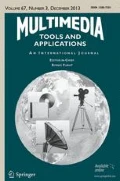Since the late 90s the Content-Based Multimedia Indexing (CBMI) has become one of the more active research topics, joining efforts in the computer science (e.g., data mining, information retrieval) and signal processing (e.g., digital image and audio analysis) communities.
Since the very beginning, the CBMI community has seen the evolution of research both from a methodological point of view and also from an application point of view. The proliferation of machine-learning approaches in supervised and unsupervised frameworks have witnessed to deal with the phenomenon of large scale in multimedia indexing and retrieval tasks. Content description methods have to make a progress in view of new application areas such as medical images and social media retrieval.
Information fusion for efficient mining of multimedia content and also the classical task of information abstraction have tremendous opportunities when applied on multimedia data. The evaluation metrics also will have to progress in the nearest future exploiting the insights gained from the user studies in the field.
The International Workshop on Content-based Multimedia Indexing has been established as one of the most important forums for the presentation of the newest ideas and original research results in the field.
Following the eight successful previous events of CBMI (Toulouse 1999, Brescia 2001, Rennes 2003, Riga 2005, Bordeaux 2007, London 2008, Chania 2009 and Grenoble 2010), the Video Processing and Understanding Lab (VPULab) and the Information Retrieval Group (IRG) at Universidad Autónoma de Madrid organized the CBMI’2011 event in Madrid from 13th to 15th June 2011.
CBMI 2011 brought together the various communities involved studying in the different aspects of the content-based multimedia indexing, retrieval, browsing and presentation issues. The scientific program of CBMI 2011 included invited keynote talks and regular and special sessions with contributed research papers.
CBMI 2011 received 77 submissions (71 papers and 6 demo proposals) from which the program committee selected 26 for oral presentations, 14 for poster presentations and 3 for demo presentations.
This special issue of the MTAP journal was created to publish both proposing new extended versions of CBMI 2011 submitted papers and also completely new contributions.. In response to the open call, 16 papers were submitted and after rigorous reviewing according to the journal rules, 5 of them were finally accepted for publishing.
The first two papers deal with audio indexing: “Evolutionary Discriminative Confidence Estimation for Spoken Term Detection” by Javier Tejedor, Alejandro Echeverría, Dong Wang and Ravichander Vipperla, tackles a new approach for spoken term detection in the framework of evolutionary discriminative analysis, which, as the experimental validation shows, outperforms multi-layer perceptrons and support vector machines for this task; whilst “Automatic Detection of Known Advertisements in Radio Broadcast with Data-driven ALISP Transcriptions” by Houssemeddine Khemiri, Gérard Chollet and Dijana Petrovska-Delacrétaz, presents an audio-based system that automatically indexes and searches for known commercials making use of ALISP transcriptions modeled by Hidden Markov Models.
The two following papers deal with visual indexing: ”Classifying Cinematographic Shot Types” by Luca Canini, Sergio Benini and Riccardo Leonardi, studies the classification of video shots into Long Shots, Medium and Close-ups using a combination of Decision Trees and Support Vector Machines, applied to geometric, colour, motion and spectral descriptors; afterwards “Competitive Content-Based Video Copy Detection using Global Descriptors” by Juan Manuel Barrios and Benjamin Bustos proposes an approach for video copy detection based on a combination of global descriptors, an automatic weighting algorithm, a pivot-based index structure, an approximate similarity search and a voting algorithm for copy localization.
Finally, multimedia information indexing, browsing and presentation is covered in “Interactive Multi-user Video Retrieval Systems” by Marco Bertini, Alberto Del Bimbo, Andrea Ferracani, Lea Landucci and Daniele Pezzatini, where the authors present two ontology-based systems for video annotation, search and browsing, exploiting current search technologies in a multi-user scenario and for collaborative search.
We warmly thank all those who have helped to accomplish the task of successfully organizing this special issue of MTAP and CBMI 2011. We want to thanks specially the technical chairs of the conference (Jesús Bescós, Guillaume Gravier, Joemon Jose and Paulo Villegas) and the reviewers of both the conference and this special issue. Their contribution was the basis for selecting the high quality of the works presented here. We also thank all the authors of the papers submitted to the workshop and to this special issue; they constitute the true force behind the success of the workshop and are the first accountable for the quality and the interest of this issue.
José M. Martínez
Bernard Merialdo
Jenny Benois-Pineau
Joemon Jose
MTAP CBMI 2011 SI Guest Editors
Author information
Authors and Affiliations
Corresponding author
Rights and permissions
About this article
Cite this article
Martínez, J.M., Merialdo, B., Benois-Pineau, J. et al. Preface for the special issue of MTAP following CBMI 2011. Multimed Tools Appl 62, 1–4 (2013). https://doi.org/10.1007/s11042-011-0927-6
Published:
Issue Date:
DOI: https://doi.org/10.1007/s11042-011-0927-6

